Travel Story: Thunders from Glacier Perito Moreno | Four Years Celebration
Heeeyho Readers! A post to celebrate a great achievement.
I'm waiting since last summer to compose this giganormous post.
Exactly four years ago, on May 9th, 2018, I wrote a story that changed my life. That morning remains fresh on my mind — a humid, chilly, and ordinary day for a beginner travel writer —, when I checked the notifications. Shock. An uncontrollable and genuine smile escaped; my eyes widened. One of my travel stories had reached $100 in votes. Holy spaghetti!
A parenthesis: Such feeling is only understandable for those who've been on the blockchain for enough moons. Everyone remembers their first @Curie upvote four or five years ago. It was legendary. Comparable to loosing our virginity, a sort of blockchain-blogging virginity. Or a testament of quality. Or an important vote of trust. You name it. Ask any veteran and they'll say, "Kid, seat and listen about my Curie moment." It's not an exaggeration.
The amount of support on that post inspired me to continue writing. Subsequently — not without procrastinating, studying a lot, and drinking gallons of coffee —, the first sketch of a book was born. Out of 484 posts on the blockchain, that's the one I'm proudest.
So,
to celebrate the four years of that moment, I decided to post the complete Chapter 8 of Tales of a Patagonian Journey. This is the mastered version of a memorable post of many moons ago. I hope you enjoy.
Original post on May 9th, 2018: Travel Story: Hitchhiking to Perito Moreno Glacier & Washing Clothes on a River
Tales of a Patagonian Journey link: Amazon
Chapter 8
Thunders from Glacier Perito Moreno
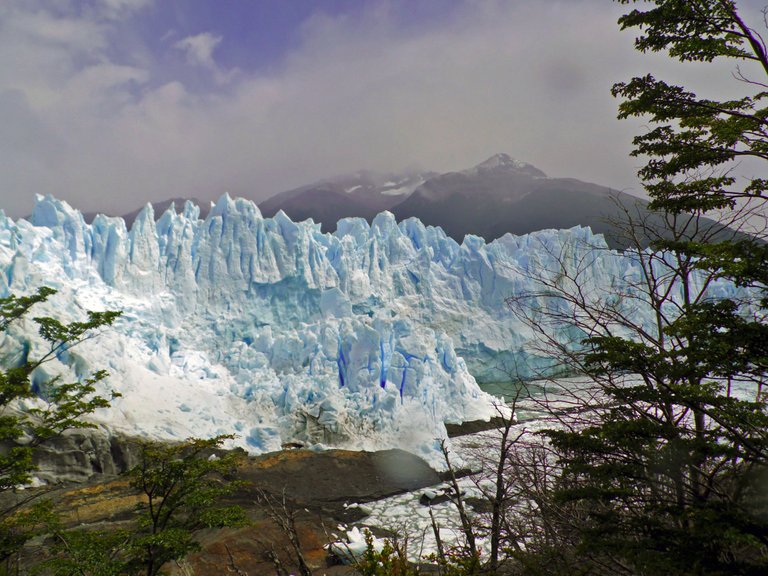
January 16th, 2017. In El Calafate, Argentina. The trip from Torres Del Paine zigzagged the border between Chile and Argentina across the arid steppe. Four hours with a superb well-educated couple from Buenos Aires that, not only drove me here, but also taught me about the Patagonian steppe and the meaning of Calafate. Tomorrow I plan to see glacier Perito Moreno.
Rafael seemed around sixty-something. His gentle, wisdom-inspired voice required attention from the listener. Rafael carried a professional camera that he revealed was a passion and a tool for his future photography book. His wife, Marisa, was younger than him. She drove the pick-up truck with precision around the rocks and holes and other bumps of that rough Patagonian road.
“Do you know what Calafate is?” asked Rafael at one point.
“I've heard it's a plant, isn't it? Some sort of berry.”
“And... Did you know that anyone who eats a Calafate berry will return to Patagonia again one day?” I thought about what Rafael had asked and sought to understand his Spanish.
“Why do you say that, Rafael? That those who eat Calafate return to Patagonia?”
Rafael then took the time to explain. Sometimes he turned to the back seat to look at me. And I curved in between the front seats to listen.
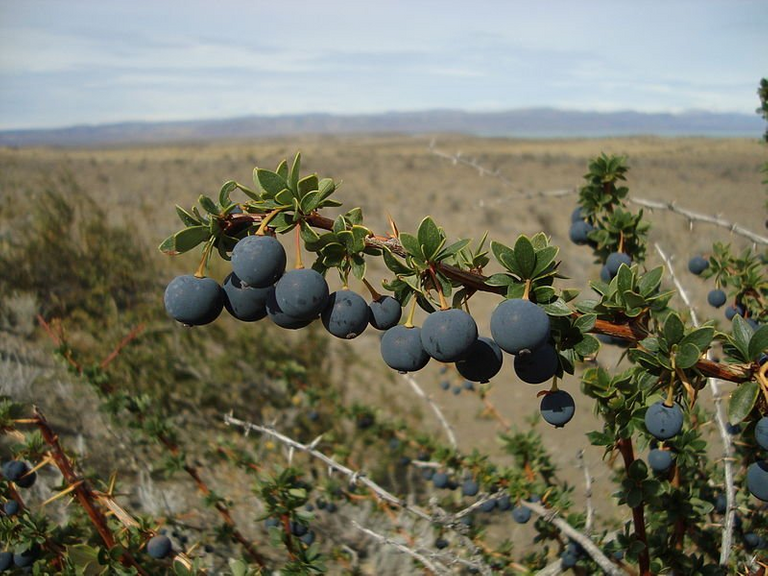
“Well,” he started, “It dates back in history to the Tehuelche times. Before the Patagonian winter arrived with the snow covering the fields, the tribe traveled north in search of food. In one of those journeys, an elderly healer was too weak to follow, so she wisely told the tribe that they could go, and she'd wait for them until the winter ended. The tribe built a hut and provided her with a stash of food. The healer said that she wouldn't feel lonesome because the birds were there to make her company. And so, the tribe departed. The tribe came back after the winter. The old healer was still alive but mortally depressed. Why’s that?”
“What happened? I don’t know.”
“Imagine Patagonia. See how the steppe is an immense desolation? Imagine the same desolation covered in snow.”
“Hum, I imagine it would’ve been devastating.”
“Tremendously, beyond imagination,” Rafael affirmed. “With the snow covering the fields the animals and birds fled, leaving the old woman alone against the harsh conditions.” Rafael turned to me. I had my eyes wide open. He continued. “She then prophesied that when death came upon her, she would turn into a tree. The tree would provide fruits so, even in the winter, the birds would still be there, and everyone would come back to collect the berries.”
“She turned into a Calafate tree?”
“Legend says she turned into a Calafate tree,” Rafael repeated with a gentle smile.
“Have you eaten calafate?” asked Marisa.
“Humm, not yet. But I’d better eat, right?” I joked.
Incredible to hear the tale from the locals, not through books or silly videos on the internet. Rafael’s storytelling made me eager to discover more. We continued our trip, talking about the various Argentinean stories, geography, and the exploration times mostly. How amazing those two were. They taught with a sparkling enthusiasm. Rafael and Marisa had their daughters independent—two grown women—, which granted them plenty of time to travel. Rafael was a semi-retired architect whose profession shared space with a passion for photography. Marisa was an artist. They seemed highbrow, the type of people you sit for hours while drinking wine. I wanted to abstract more.
“What do you know about Perito Moreno?” I inquired.
“The man or the glacier?”
“The man.”
“Oh. He was a tremendous academic here in Argentina during the eighteen hundreds. Absolutely influential, prominent. Do you understand?” said Rafael with an evident tone of respect. “Moreno discovered and named most of what you see today: Lake Argentino, Mount Fitz Roy, etc. He didn’t discover mount Fitz Roy, but he named it. He discovered the glacier, the one in El Calafate, glacier Perito Moreno. He contributed to world-wide anthropological studies. By the way, do you know why he’s called Perito Moreno?”
“I do not know,” I revealed.
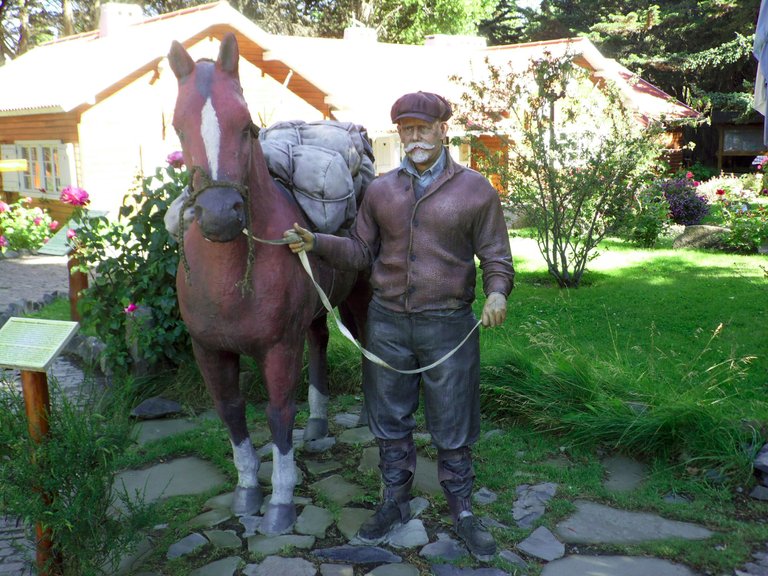
“Francisco Pascasio Moreno was his name. Perito comes from expert, especialista,” explained Rafael. “He helped survey and delimit the border between Argentina and Chile. There’s…”
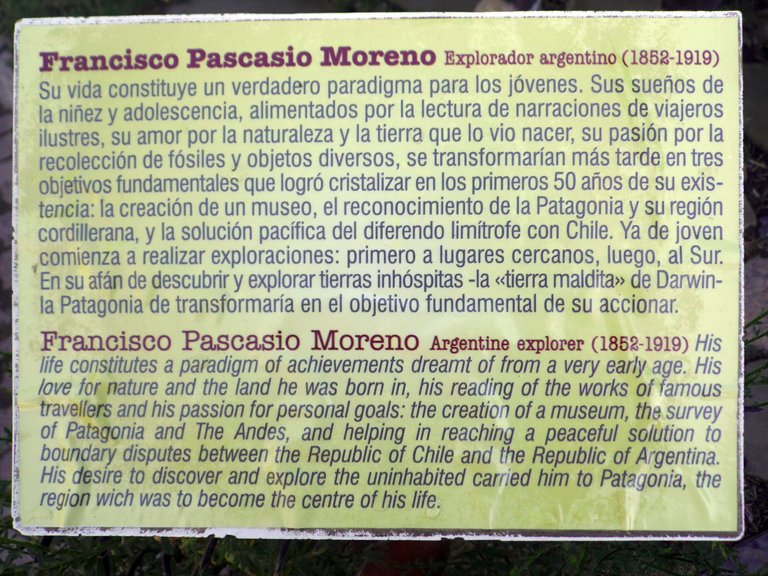
“Speaking of border,” interjected Marisa. We approached the border between Chile and Argentina in a passo called Cancha Carrera. The simplest of the border checkpoints survived in the middle of the steppe—a mere solar-powered complex of old buildings with green metal foil roofs. “You cross on your own, Arthur. Ok? We’ll pick you up at the other side,” continued Marisa. I dealt with the paperwork and was sent on my way back to the pick-up.
“You were saying… about Perito Moreno,” I rejoined Rafael.
“About Moreno. Hum. Ah, yes. There’s his book… it’s… Marisa, what’s the name of that book? From his first voyage?”
“Reminiscencias Del Perito Moreno?” suggested Marisa.
“Yes, Reminiscencias Del Perito Moreno. Read this book. You have no idea,” beamed Rafael. “There’s the story of how Moreno was captured by the Tehuelche and escaped the night before his execution. Brilliant story.”
We chattered about architecture, sustainability, and engineering until we arrived in El Calafate. The sun lightly created shades below the pine and poplar trees at the main avenue—Avenida Libertador.
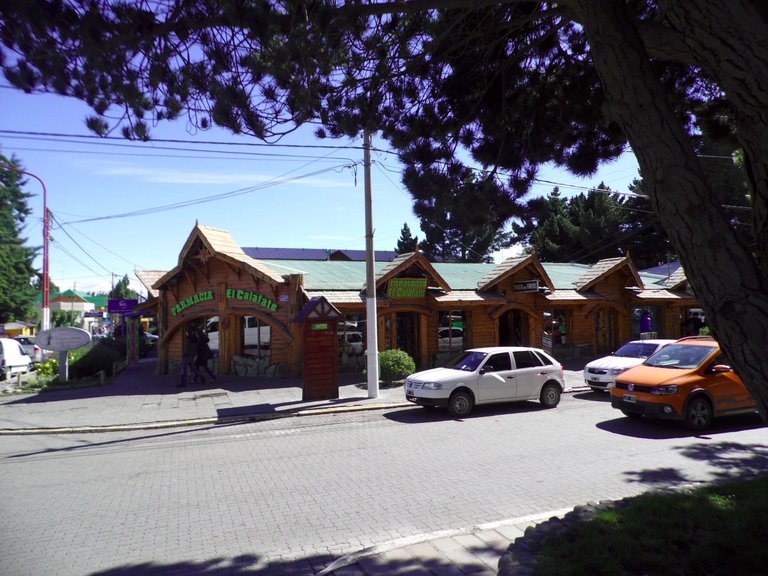
Arrival to El Calafate followed the same monotonous routine of a broke backpacker: find a place to sleep and a shower, as cheap as possible. Truth is, I wanted to spend more time with Marisa and Rafael. El Calafate wasn’t the type of city for me, at least I sensed so after a first vagabonding around. But because I felt mucky and drained, crashing at an organized campsite for seven Dollars sounded reasonable.
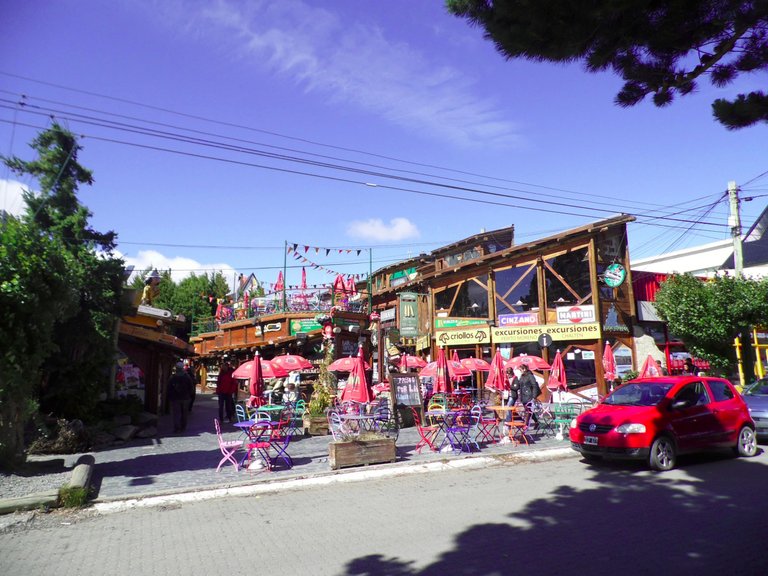
The place was called El Ovejero and had a conjunct fancy restaurant with a display window where the most enormous, juicy, and appetizing asado circled over a fire. I ignored the juiciness of those crispy ribs and contented myself to canned tuna and pasta.
Ben was a British digital nomad, a programmer who used the restaurant’s Wi-Fi to work. He had his tent in front of mine. Ben showed up as I finished eating.
“Moite, I cun’t wok wiv the smell of that bloody asado.” I laughed. That’s what happens when you are a broke backpacker.
January 17th, 2017. Money is draining fast. Time to find better solutions in nature. I’m blowing the wallet on comfort I don't need. I’m heading to the outskirts, let’s see if I reach Lago Roca on the way to the Perito Moreno glacier. I’m feeling great. Energetic. And most importantly, not lonely. I’m happy I bought eggs yesterday, just had them for breakfast. Ben went back to the restaurant, he said “moite, I swear, that focking asado bettah not be there.” Gotta use this beautiful morning to hitchhike. Write again later.
I followed Avenida Libertador westward and put the thumb to work. Nothing seemed to work. I danced, used the thumb, wrote a sign, and ran along cars that slow-moved over the speed bump. Nothing. Nada. The sun rotated above me; it was ‘round 1400 o’clock when an old Peugeot hatchback stopped.
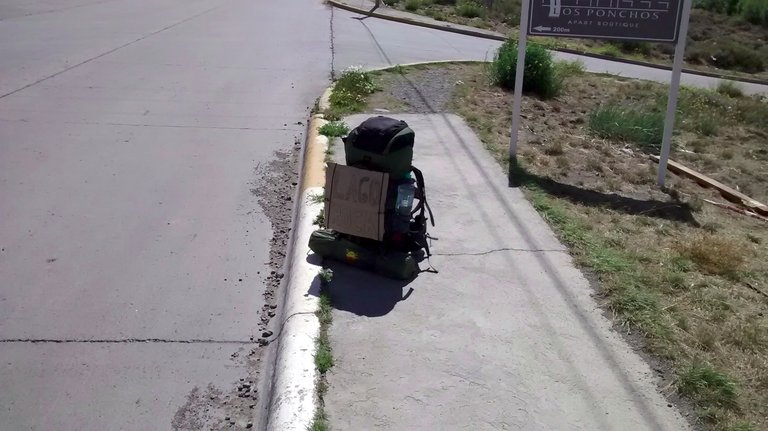
“Hop on, hermano!” shouted the smiling chubby driver. He seemed outgoing, so I jumped in. “I have no idea where you are going, but I'm bored and could enjoy some talking,” he continued.
“Hah, good to know. I hope you don’t take me somewhere to remove my organs,” I joked.
The chubby young man chocked; he had a chubby man’s contagious laugh. “Don’t worry, hermano. I saw your sign. Lago Roca?”
“Are you going there?” I asked.
“I'm not going there. At the intersection I take a right to Puerto Punto Bandera. I'll drop you at the access road to Lago Roca.”
“Is the lake far from the road?”
“… only five kilometers,” he assured.
“Five?”
“Ye, ye, ye. About five.”
We went on discussing random topics. He dropped me off at the farm gate that lead to Lago Roca. “Take care, boludo. See you one day. And don’t go to Puerto Punto Bandera, there’s nothing there,” he advised before a profound laugh.
I aimed for the five-kilometer walk away from those frenetic tourists. A youthful hippie-looking vagabond couple devoured bananas on top of a white wooden gate just as I began. Their bicycles were leaning on the overgrown grass against a post. The guy had a ponytail half dreadlock sort of hair; his skin seemed tanned from the sun. The girl had a thinner, delicate dreadlock and wore a thick pair of black-rimmed glasses. They seemed legit, humble vagabonds. I liked them right away.
“You coming from the lake?” I asked.
“Que onda, hermano. We wanted to go there but it’s thirty kilometers,” said the girl.
“Thirty? I’ve heard of five.”
“Nada, weon. Thirty or more.”
“Fucking Christ. I’m not walking that. No way.”
“Poh,” exclaimed the guy from the gate, “walking? We’re on cletas and gave up.” I scratched my head. What will I do now? We all wanted to do the same thing: spend the night and visit Perito Moreno Glacier. It was so simple, yet so complicated. “But, look,” continued the guy, “We are thinking about asking this weon on that farm and see if he gives permission to camp somewhere. Wanna come?”
A humble farmhouse seemed inhabited across the road. We thought it would be a brilliant idea to ask for a space to set the tents for a night. We crossed the gate. As we walked towards the house, three dominant beasts raced straight to us, barking and drooling and circling around. We stopped. The dogs kept a distance, but lunged trying to intimidate us. After the dogs followed a middle-aged tubby farmer wearing his beret and boots.
“Quieto! Pasa para allá!” shouted the farmer to the devilish beasts. The ferocious monsters moved behind him and that eased our hearts. “Come on, chicos. They are not going to attack. What do you want?”
Thinking about those beasts made us evaluate the idea of camping on that man’s land. But Esteban—the hippie guy’s name— moved ahead.
“We’re backpacking to Perito Moreno. Wonder if you don’t have a piece of land for us to camp. We won't bother you or anything. Cachai?”
“Hombre, the boss is not here. I'd need to talk to him.”
“And the land by the river? There’s an abandoned house there,” I noted.
We were about to give up when the tubby man pointed to a pick-up leaving the next-door field. “That’s the owner right there. Quick. Run there.”
Esteban sprinted and whistled to call the farmer's attention. The dogs barked again. “Pasa para allá!” shouted the tubby man. Tanya and I awaited as Esteban talked to the farmer. Esteban sprinted back.
“Come on,” he breathed, “he said we can stay in his property by the river. The house is abandoned, no one will bother us there.”
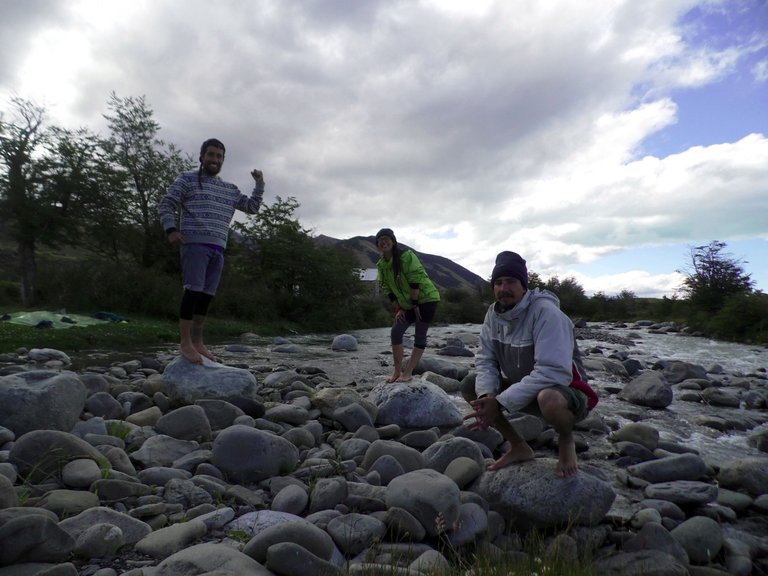
Brilliant place near the Mitre River. We set camp below a shade some meters away from the sound of those magnificent crystal-clear waters. The three of us devoted to having fun and organizing stuff for the rest of the day. Tanya—the hippie girl—and I washed clothes in the river as Esteban tried fishing.
“So, you traveling by bike?” I asked.
“On cletas, yes,” said Tanya.
“But you are from Chile?”
“Weon, is it the accent?”
“Yes,” I laughed. Indeed, Chileans had a distinct accent with unique slangs.
“We are from Santiago, cachai?” she continued. “We worked for seven months at a casino in Punta Arenas to raise cash. Then we bought the bikes and everything and are going back to Santiago on cletas.”
“Amazing. I imagine you suffer with this wind. No?”
“Uff, weon. One day we cycled fifteen kilometers in a day. Puto viento.”
Tanya tied a line in between trees to hang our rags. I’d been wearing the same jacket for weeks. That is the life of a broke backpacker in the middle of nowhere; you wash clothes in rivers, and to be honest, they become cleaner than washing at home. Esteban’s fishing yielded no results.
“I saw the trout jumping. Or was it salmon?” he swore.
“Of course you saw, Esteban,” scoffed Tanya.
In the end we resorted to tuna fish with pasta. I loved those two for their unique views of enjoying life abstained from the bullshit of tourism and visual appearance and notions of a dangerous world we are bombarded with. They just cycled and accepted whatever happened. They managed to achieve freedom—as a couple. Amazing. Superb.
January 18th, 2017. Esteban and Tanya are up already. I can’t deny, leaving the warm sleeping bag is painful. We’ll hitchhike to Perito Moreno glacier. I’ll let ‘em go first to make our chances greater; also, because it gives me extra time to go about the morning routine and all.
Just as I prepared to jump over the locked farm gate, Tanya and Esteban showed up. They’d left the bicycles hidden behind the abandoned house.
“What? You giving up?”
“Qué paja, weon. Nothing going by,” said Tanya.
“We're going by bicycle.” Continued Esteban.
“Bueno.”
I filled my pocket with pebbles to distract the mind. The game consisted of throwing little rocks as near as possible to the white line painted on the asphalt; whoever landed it closer won. In that case, I’d be the sole winner. Hah, super exciting. A fancy car stopped a few minutes later. Camilo and Regina were a young Chilean couple from Coyhaique. Both medics on vacation. Warm people. They’d been to Torres Del Paine for the eight-day trek. I narrated my miserable story there and we all laughed about the foolish idea. Before long, we passed Tanya and Esteban.
“I’m camping with those two,” I said when I saw them on the road.
“Can I tease them?” I opened the window and put half the body out.
“Come on,” I shouted. “Push, push, push. Wait for you there!”
“Eeeee weon. Dale, dale,” came as an answer.
Reunited again with Tanya and Esteban, and now with Camilo and Regina, we teamed to explore the park. The gang matched right away, as long-lasted friends of some sort. Hilarious jokes were thrown at each other while we queued for the park's transportation.
In the Parque Nacional Los Glaciares (Los Glaciares National Park) a fee is applied. No escape; no stupid plans. The ticket went for ten dollars—two days’ worth of food. Minibuses transport tourists uphill into the park. The road was concealed amid a forest, from where the glacier remained hidden. I shock Esteban by the shoulder.
“Glacier Perito Moreno, let’s go, let’s go.”
Esteban rubbed his hands in excitement. Tanya smiled from ear-to-ear. Camilo and Regina prepared a camera to register the moment. After the first spasm of excitement, we seemed ready to walk down the pathway that led to a viewpoint. Brrrrrrrrr-boooooooom. Thunder sounds emerged from the valley. What the heck. I stared at the sky; it was sunny.
“Puta madre,” exhaled Tanya.
“Was that the glacier,” asked Regina.
We rushed down the wooden pathwalk, jumping two steps at a time. Brrrrrrrrrr-booooooooom. There it was, majestic, imposing, freezing, and alive. It moved, broke into pieces, grunted. Five kilometers of width, almost seventy meters high. I compared the glacier to The Wall, from the story Game of Thrones, by George Martin. The purest solid-state freshwater there is. Some say it’s the only glacier in the world that is not losing mass. Gigantic pieces of ice detached from the glacier. Crrrrrrrraaaaaaaack-booooooooooooooom-shhhhhhhh. The sound echoed across the valley; the mass launched waves against the shore.
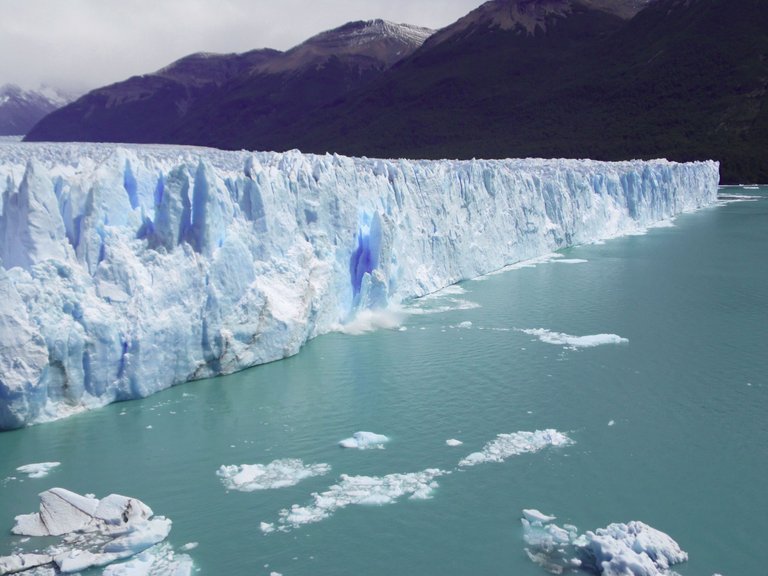
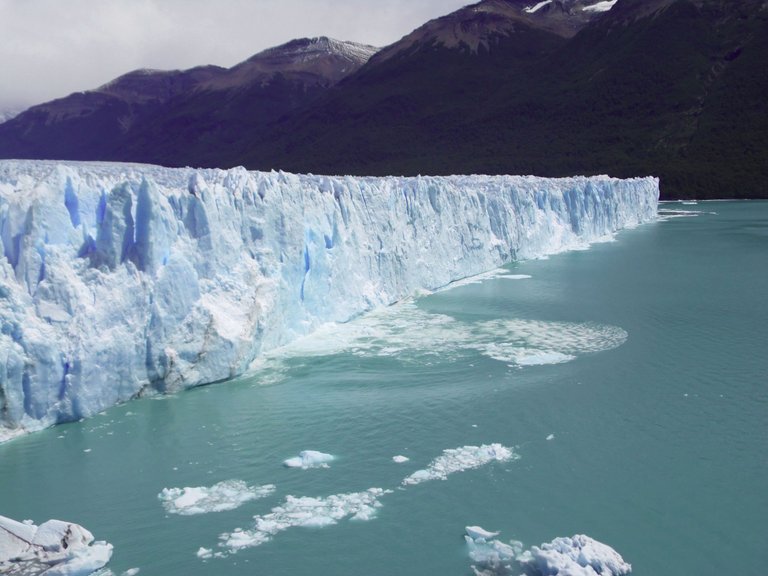
I noticed a desperate Brazilian girl moving her hair from side to side trying to take the perfect selfie. She ranted at her mom about the damn photo. Every time the girl turned around to go for a better shot a grotesque piece of the ice wall fell, infuriating her even more. Now she raged about missing the show. Poor girl, sucked into the dreadful internet abyss. Drowned in a false life perpetuated by stupid social media that destroyed a genuine contemplative moment with her beloved mom, who was possibly paying her the trip. What can vanity do to a person? Her life is none of my business, but it made me think. Is this what the future of technology reserves for humankind? A world where people are incapable of socializing properly in detriment of a parallel life in the matrix? Why traveling if one can plug in a virtual reality goggle and go anywhere—at least one can complain from the sofa.
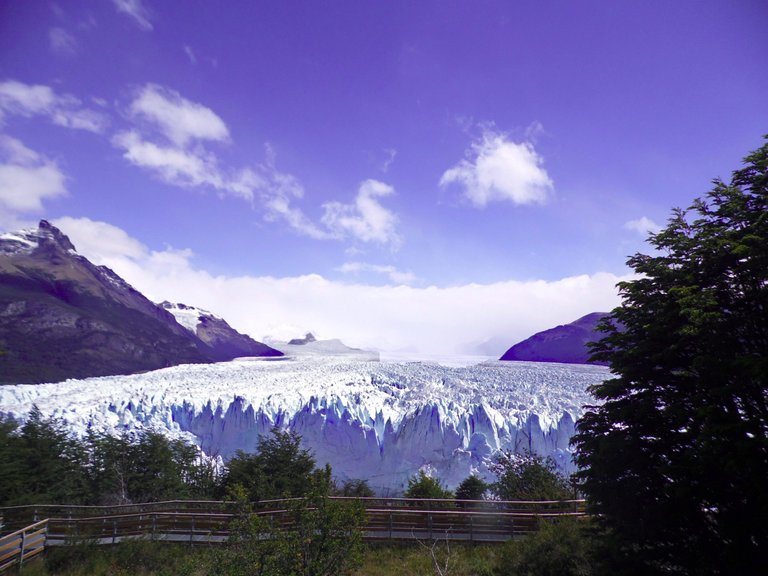
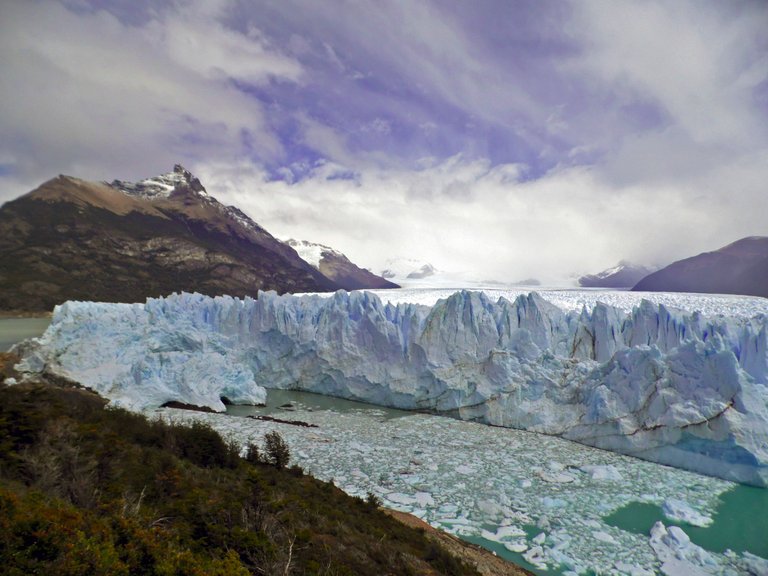
In complete contrast, I saw older fellas sitting there, just staring at the glacier. Staring! No cameras nor cellphones. Will we create a world where sitting on a bench appreciating something is seen as weird? A unison “ohhhhhhh” emerged at every big bang from the glacier. Folks clapped, laughed. Some cried. There’ll be a day when nature reclaims its space. Mother Nature is powerful.
I ended up separating from Esteban and Tanya later that day. Camilo and Regina continued their trip from El Calafate to El Chaltén and agreed to give me a lift. It’s a pit that such dear friends had to go—I miss them.
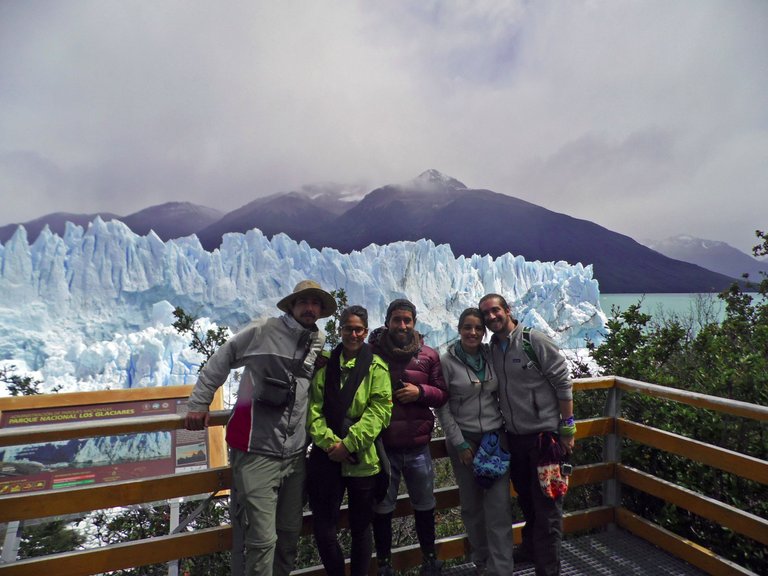
I hope you have enjoyed this story.
Peace.
Did you know that I have a book out? Check this!
Access Link: https://www.amazon.com/dp/6500272773?
If you enjoyed this post consider leaving your upvote for a hot coffee.
Find me on Twitter: https://twitter.com/mrprofessor_
~Love ya all,

Disclaimer: The author of this post is a convict broke backpacker, who has travelled more than 10.000 km hitchhiking and more than 5.000 km cycling. Following him may cause severe problems of wanderlust and inquietud. You've been warned.
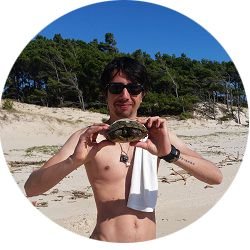

Congratulations, your post has been added to Pinmapple! 🎉🥳🍍
Did you know you have your own profile map?
And every post has their own map too!
Want to have your post on the map too?
https://twitter.com/mrprofessor_/status/1523780940807376896
The rewards earned on this comment will go directly to the person sharing the post on Twitter as long as they are registered with @poshtoken. Sign up at https://hiveposh.com.
very beautiful scenery. very beautiful ice cliffs. I hope one day I can go there.
Heeey, thanks for the comment. Don't hesitate if you ever have the chance, it's one of the most beautiful places on earth.
AWESOME! Your descriptions are EPIC :)
I love myths and the wisdom hidden in them. As well in all these humble folks that enrich our time here. Sometimes synchronicity works perfectly, worked perfectly for you for sure :)
I knew you were going to say "tuna and salad", haha! I remember your "tips" post, also great!
The glacier is magic, "frozen and alive". It is one of my dreams to go to Patagonia, partly I owe it to Sepulveda. What a place!
As for the girl, a friend says that we live in the time that those who take selfies now have children, scary. I agree with him, haha!
Thank you for sharing this beautiful giganormous post @mrprofessor!
Ye ye ye thank you! Patagonia is full of legends, love it.
Isn't it true? What a time to be alive. It makes me kinda scared to think about the future.